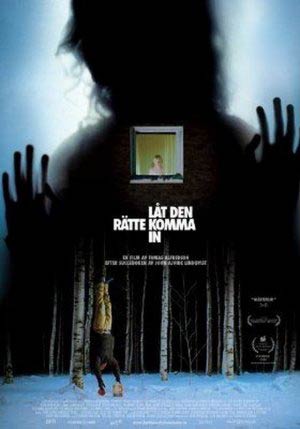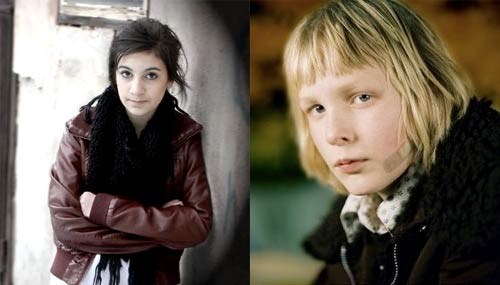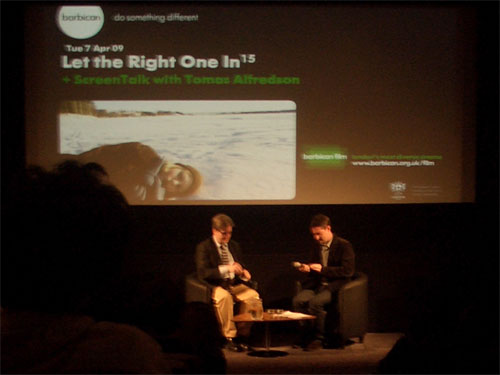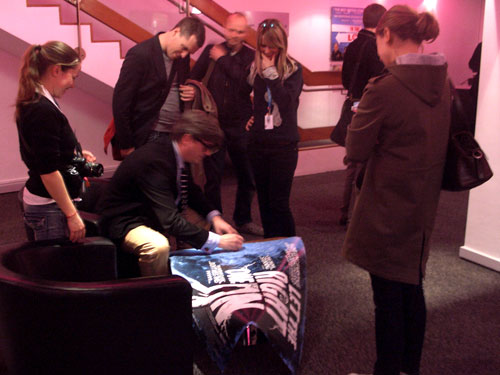"Let The Right One In" - Director's talk with Tomas Alfredson at the Barbican
On Tuesday I went to the Barbican to see a preview screening of "Let The Right One In", followed by a Q&A session with director Tomas Alfredson. The film is based on the novel by John Ajvide Lindqvist, who also wrote the screenplay, and it opens in the UK today.

SPOILER ALERT: This article contains mild spoilers.
Under the influence
One of the interesting things that came out of the interview afterwards was the way that the director tried to avoid any influences. He said he tried to watch as little TV or film as possible, otherwise you find yourself saying "I want the colours to look like that film, or I want the editing to be done as it was in such-and-such".
This was also important to explain to the people who finance his movies. He said that they always want to know what the film will look like, and he always explains: "I don't know, I've never made this movie before. Let's find out shall we?".
Part of his method, he explained, when making a film, was to chooses a piece of music, and listen to the same piece every day, letting it be his guide. His mantra, though, was to never reveal what the inspirational piece was.
Vampire lore
Alfredson also made an interesting point about the fantasy nature of the film. Although it features a vampire, it is very realistic and down to earth. He claimed to have been totally ignorant of vampire lore and the key movies in the genre. He said that, in fact, it is Oskar's experiences with dealing with the bullies in his life that attracted him to make a movie of the novel. The original novel is a very autobiographical tale of growing up in the 1980s under the shadow of the school bully. "Autobiographical, except for the vampire bit, obviously" he added.
Period detail
Like the novel, the film is also set in the early 1980s, but the period detail isn't "laid on thick". Indeed, Alfredson said he set out not to use real music from the era, as everyone in the audience has their own strong nostalgic associations with certain tracks. Instead, on screen, Oskar's favourite track which features a couple of times, is supplied by a specially recorded piece from Per Gessle of Roxette. It sounds like it could have been recorded in 1982, without evoking anybody's specific memory of the era.
Working with children
Alfredson was asked about whether the children in the film were professional actors or not. "Yes", he laughed, "they've been acting for twenty years!". More seriously, they'd had open casting for the movie, and seen between 3,000 and 4,000 children in a twelve month process before settling on Lina Leandersson and Kåre Hedebrant.

The roles are very demanding of the children, who are barely ever off screen. Tomas Alfredson explained that he had not allowed them to read the script, and instead had taught them the day's lines each morning in one-to-one coaching. This kept their performances fresh and natural.
The 'Swedish' question
When asked about whether international audiences reacted differently to Swedish audiences, Tomas noted that there were some Swedish details that passed the international audience by. There were also some differences in reactions to key characters.
He had found that American audiences assumed one of the characters was gay, and he couldn't see where that came from at all. The audience mostly laughed, and seemed to turn round to each other en masse and say, "Oh, yeah, I thought he was gay too". I certainly had!
The trouble with subtitles
Subtitles are a box office killer in the UK and US, and so an English language remake of the film is scheduled to be released in 2010. This version of the film has also had its problems. The US DVD issue has been released equipped with an alternative set of subtitles that, according to the director of the movie, "stink". However, he wryly observed "They've made a lot of copies, and they are going to sell them anyway. It is out of my control."

Open to interpretation
One of the nice things about the film is that it is very open to interpretation. The director explained that they had left a couple of the darker themes from the novel out of the movie in favour of concentrating on the 'filet in the middle - the love story'. He felt that some of the elements of the novel, around paedophilia and sexuality, would have brought too much distracting baggage to a film.
Tomas Alfredson said that his fantasy for the central characters is that they went on to become eternal vampire lovers, although a member of the audience pointed out that the form of the movie could be seen to show the idea that this was a cyclical story that kept recurring in Eli's life. I think I prefer the idea of the happy ending.

'Let The Right One In' opens in UK cinemas April 10th, 2009.